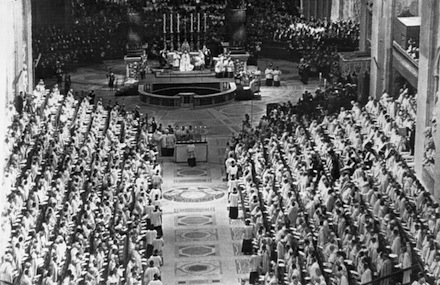
The Church was just not ready to face the changes the 1960s threw at it
By FRANCIS PHILLIPS on Friday, 31 August 2012

The opening of the Second Vatican Council in October 1962 (AP)
In the uplifting homily which Bishop Mark Davies of Shrewsbury gave to the Latin Mass Society pilgrimage to Walsingham on 26th August, he reminded his listeners that “In October this year our Holy Father Pope Benedict invites us to celebrate a “Year of Faith”, fifty years after the solemn opening of the Second Vatican Council. The central aim of the Council was the transmission of the Church’s faith amid the new and rapidly changing conditions of our time. The greatest concern of the Ecumenical Council Blessed John XXIII declared on that October day “is this, that the sacred deposit of Christian doctrine should be guarded and taught more efficaciously”.
Bishop Davies continued, “As the Latin Mass Society, as the faithful attached to the Extraordinary Form of the Roman Rite, as pilgrims to Walsingham, we accept together with enthusiasm the call of the Second Vatican Council in all its authentic teaching and the invitation to this “Year of Faith” to which the Holy Father calls the whole Church.”
Bishop Davies is right to show his loyalty support for the Council of 1962-1965 – even though he, as well as his listeners, knows full well that an almighty turmoil within the Church actually followed in the wake of the Council. This turmoil, especially in the field of catechetics, has been documented for years in The Flock, the newsletter of Pro Ecclesia et Pontifice, edited by the redoubtable Mrs Daphne McLeod. The latest edition is on my desk with the ironic headline, “Fifty ‘Glorious’ Years?”
Daphne writes that before the Council “the Catholic Church grew and thrived… Missionary work grew too… Many excellent spiritual books were written [which] show how well the teachings of the Church were known and loved by Catholic before 1970, in sharp contrast to what Pope Benedict calls the ‘widespread religious ignorance’ found among most Catholics today…”
The newsletter continues in the same vein, with all the statistics of a thriving Church before the Council, and with sub-titles such as “How Vatican II was hijacked”, “The fruits of Vatican Two”, “How we got “Modern Catechetics” and so on. I don’t doubt that much of this analysis is correct and I don’t want to challenge her account. But there is just one question that niggles me: if the Church was so strong before the Council, with its “crowded churches for Sunday Mass and for the non-obligatory Rosary, sermon and Benediction, plenty at weekday Masses, packed seminaries and noviciates, as well as a steady stream of converts” etc, how did it collapse so quickly when the Council ended?
I know it is considered very bad form to bring Germany between 1933 and 1945 into an argument, but I’ll do it anyway. I have been reading a fascinating book by the well-known German historian, Joachim Fest, entitled Not Me: Memoirs of a German Childhood. Fest’s father, Johannes, a principled, Catholic headmaster of a Berlin secondary school and a political supporter of the Weimar Republic, loathed the National Socialists, refused to join the Party and thus lost his teaching post in 1933. His son reflected in these memoirs, that although he and his milieu had been brought up with “middle class and civic virtues” in a cultured and Christian European country, nonetheless “inwardly this stratum of society had decayed long before, so that I was brought up in accordance with the principles of an outmoded order.”
His own family might have held onto civilised and Christian values, but as a whole the German middle class – the class that traditionally, in any society, tends to run the institutions of local and national power – had “decayed”. Thus, he writes, it was “hopelessly unprepared” for the dictatorship that followed in 1933.
All right, it is a far-fetched analogy – but a Jesuit priest friend who has recently died aged 95, Fr Hugh Thwaites, answered my niggling question in much the same way that Joachim Fest did when he looked at his father’s generation; Father told me he could see the signs of decay in the Church in the 1950s, well before the Council got going.
Unlike Daphne McLeod, he felt Catholics in general did not really know their faith and were going through the motions of religious practice out of habit and unthinking conformity; it was not a living faith. That saintly man, Frank Duff, founder of the Legion of Mary and given the honour of being a lay observer at the Council, was more damning in his judgment of the complacency of Catholic Ireland in the decades before the Council was called.
On might ask: was the Church prepared for the “new and rapidly changing conditions” of the 1960s and beyond?
We all hope a purified Church will now rise from the ashes of the past. Bishop Davies mentions the coming “Year of Faith”. The CTS, certainly one of the hopeful signs of a renewed Catholic apostolate today, compared with its faded booklets in the porches of parish churches in the past, has produced a “Year of Faith Prayer Book”. It includes prayers to the Trinity, Our Lady, the saints and for the Church and the world. Our country, which has lost its moral compass, needs many prayers as we know. Action has to begin in prayer. Using the “Year of Faith Prayer Book” would be a start.
No comments:
Post a Comment